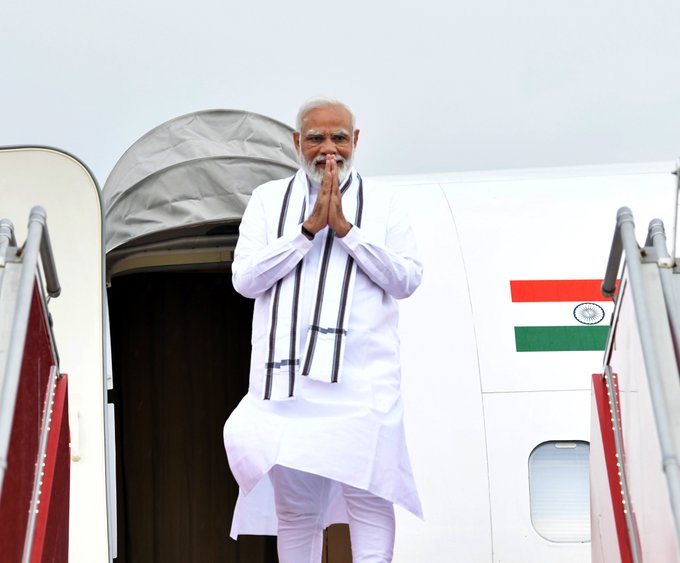

PM Modi’s visit to Bali will end with India assuming the G-20 Presidency.
Prime Minister Narendra Modi heads for Indonesia on Monday, not only to participate in the G-20 summit, but also take over the Presidency of the grouping for the coming year.
The Prime Minister’s visit to Bali is a pivotal moment, signifying the rise of India on the global stage.
Foreign Secretary Vinay Kwatra said earlier that PM Modi will be attending three crucial working sessions on food and energy security, digital transformation and health during his three-day stay in Indonesia.
On his three-day visit, Modi will have separate bilateral meetings with a number of leaders on the sidelines of the summit. Though Kwatra did not give any specific names, it is expected that the Prime Minister Modi will meet British Prime Minister Rishi Sunak and the French President Emanuel Macron on the sidelines of the summit.
“These bilateral engagements with the other leaders are still in the process of being scheduled. This is something which remains under evolution,” Kwatra said.
Once it assumes the presidency, the rise of a New India, which is ready to exercise leadership in a multipolar world will be showcased. The G-20 Presidency will symbolise India’s entry into “Amritkaal”—a golden period that will last 25 years to yield a fully developed India.
“For India, the G20 Presidency also marks the beginning of ‘Amritkaal,’ the 25-year period beginning from the 75th anniversary of its independence on 15 August 2022, leading up to the centenary of its independence, towards a futuristic, prosperous, inclusive and developed society, distinguished by a human-centric approach at its core, “ said a government statement.
The year-long presidency, with its numerous sectoral meetings that will be held across the length and breadth of India, have been carefully chosen to spotlight India’s prominence as a civilizational state. The events will therefore also be threaded with the subtext of the Modi administration’s vision of the revival of India’s ancient civilization, which is ready to show the way in tackling humanity’s major challenges, including Climate Change and military conflicts.
India’s vision in imparting fresh direction to the G20 is glaring in the Logo that has been designed for the occasion. The G20 Logo draws inspiration from the vibrant colours of India’s national flag – saffron, white and green, but includes blue as well. It juxtaposes planet Earth with the lotus, India’s national flower that reflects growth amid challenges. The Earth reflects India’s pro-planet approach to life, one that is in perfect harmony with nature. Below the G20 logo is “Bharat”, written in the Devanagari script, which demonstrates India’s unique linguistic tradition embedded in antiquity.
The theme of India’s G20 Presidency – “Vasudhaiva Kutumbakam” or “One Earth One Family One Future” – is drawn from the ancient Sanskrit text of the Maha Upanishad. Essentially, the theme affirms the value of all life – human, animal, plant, and microorganisms – and their interconnectedness on the planet Earth and in the wider universe.
The theme also spotlights LiFE (Lifestyle for Environment), with its associated, environmentally sustainable and responsible choices, both at the level of individual lifestyles as well as national development, leading to globally transformative actions resulting in a cleaner, greener and bluer future.
The logo and the theme together convey a powerful message of India’s G20 Presidency, which is of striving for just and equitable growth for all in the world, as we navigate through these turbulent times, in a sustainable, holistic, responsible, and inclusive manner. They represent a uniquely Indian approach to our G20 Presidency, of living in harmony with the surrounding ecosystem.
Unsurprisingly, the spirit of India’s G-20 Presidency will be guided by the Panch Pranas or five templates that will guide Amritkaal—the final surge that will ensure that India gallops into the league of developed nation, leaving behind a prominent and unique cultural footprint on the global stage. During his August 15 address, PM Modi had stressed that India can become fully developed only if its people have decolonised and are not enslaved to any foreign influence. He also pointed to pride in our roots, unity and sense of duty to achieve the key strategic goal.
Ahead of the Prime Minister’s visit, India’s ambassador to Indonesia Manoj Kumar Bharti told news agency ANI that during the G20 Summit, India will raise the issues of renewable energy and the digital revolution.
“India is taking forward the main points of Indonesia’s policy presidency, which are related to food and renewable energy security, health and digital transformation. However, it will also be a very good and appropriate occasion for our prime minister to tell the world leaders about the main theme of India’s presidency,” he observed.
Also Read: India assumes leadership on world stage with G-20 Presidency
Australia's High Commissioner to India, Philip Green OAM, called Yoga one of India's gifts to…
The Bharat Sanchar Nigam Limited (BSNL) has announced the soft launch of BSNL Quantum 5G…
The Indian Embassy in Iran has said that the embassy will make efforts to evacuate…
India's gross direct tax collections for the financial year 2025-26 rose by 4.86 per cent…
Russian President Vladimir Putin has said that Moscow is not seeking Ukraine's unconditional surrender, but…
Extending his greetings on the 11th International Day of Yoga, Lok Sabha speaker Om Birla…